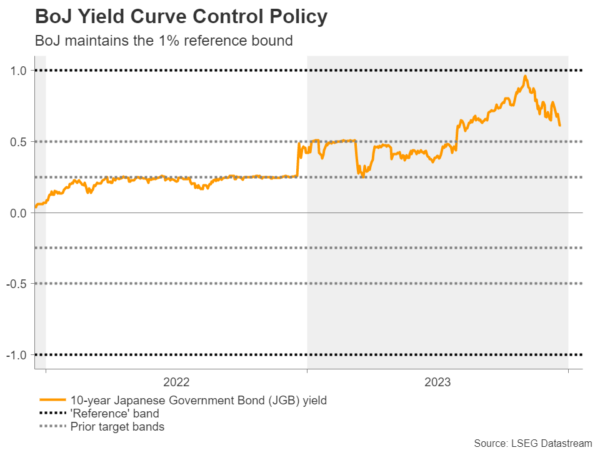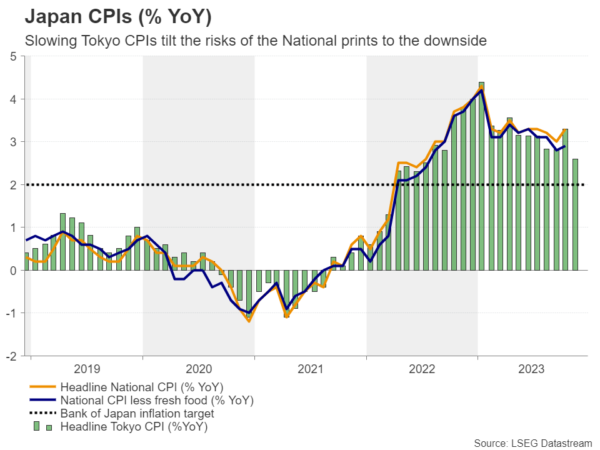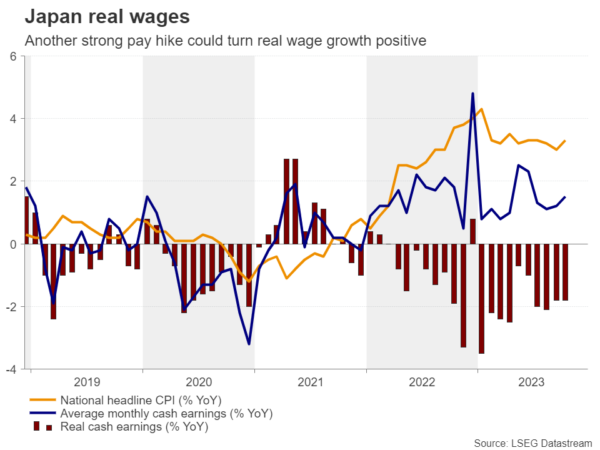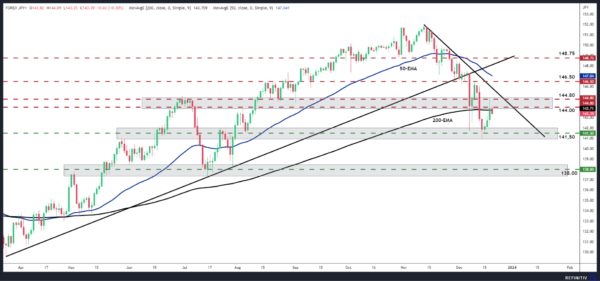- BoJ keeps policy ultra-loose, does not hint at change
- Friday’s data may reveal slowdown in inflation
- Wage negotiations key for exiting negative rates
- Next week’s Summary of Opinions also in focus
Yen traders turn attention to national CPI numbers
On Tuesday, the Bank of Japan decided unanimously to keep interest rates untouched at -0.1% and stick to its yield curve control policy framework that places an upper bound of 1% for the 10-year Japanese government bond yield as reference. With the Bank giving no signals that the era of ultra-loose policy conditions is nearing its end, yen traders were largely disappointed, with the currency turning south again.
Whether the slide will continue for a while longer or not may depend on the national inflation numbers for November, due out during the Asian session Friday, and the core one is anticipated to have declined to 2.5% y/y from 2.8%. The Tokyo CPI data for the month revealed notable slowdowns in both headline and core consumer prices, corroborating the forecast for the National core CPI and suggesting that the headline rate may have also declined.
Will a slowdown impact BoJ’s pivot decision?
That said, a slowdown in inflation may not necessarily mean that the BoJ will dismiss the idea of raising interest rates at some point in the months to come as both metrics are still lying above the Bank’s 2% objective. What’s more, the Bank is paying very close attention to wage growth and a meaningful acceleration may be the signal for policymakers to take interest rates out of negative territory.
With that in mind, a very likely month for doing so may be April, just after next year’s spring wage negotiations. In October, Japan’s umbrella labor union, Rengo, said that they will demand hikes of at least 5%, which could take real wage growth into positive territory. Considering that the market expects the Fed to cut interest rates by around 150bps next year, this may allow the yen to stay in uptrend mode against its US counterpart, even if the latest slide continues for a while longer.
Summary of Opinions could reveal more
Governor Ueda gave no clear signals on when the Bank could exit negative rates on Tuesday, saying that they will not rush into raising rates just because the Fed could start cutting in a few months, adding that if they were to act, interest rates would only rise slightly. Yet, the market assigns a nearly 40% chance for a minor rate increase at the January meeting, with that percentage rising to 80% in April.
Perhaps investors are hoping to get more clarity from the meeting’s Summary of Opinions next week, on Wednesday. Back in October, some members discussed the conditions and possible timing of a future exit from negative interest rates, but the November summary highlighted that the Bank needs to patiently continue with monetary easing. If the December one reveals that there is a fresh discussion on the matter, then the yen could stage a decent comeback.
Dollar/yen rebounds, but stays in downtrend
From a technical standpoint, despite the latest recovery, dollar/yen remains below the downtrend line drawn from the high of November 13. What’s more, Tuesday’s advance was halted near the 144.00/80 zone, with the price returning below the 200-day exponential moving average thereafter. This means that the bears could take charge again at some point soon and perhaps aim for another test near the 141.50 territory. A break lower could confirm a lower low and perhaps see scope for extensions towards the next key support area at around 138.00.
On the upside, a break above 146.50 could turn the outlook neutral, while the move signaling that the bulls are in full control may be a break above 148.75, as it may confirm the pair’s return above the prior uptrend line drawn from the low of March 24.




